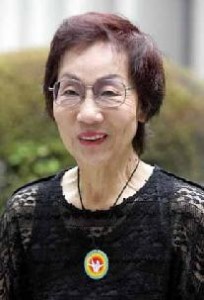Letters from A-bomb survivors to G8 Lower House Speakers, Part 2
Aug. 29, 2008
Nuclear weapons can only lead to a hell on earth
by Mieko Okada, 71, peace volunteer
On the day of the bombing I was 8 years old and a third-grader at an elementary school. I will never forget the scenes that followed the flash and the blast of the explosion. People were moaning, “Water, water” or “Please kill me.” I saw a charred baby with its eyeballs hanging down and two dead horses with their intestines bursting out.
That morning, my sister, who was a first-year student at the First Hiroshima Prefectural Girls’ High School (now Minami High School), left for school, shouting out her goodbye, and never returned. My mother, who was seriously injured when she was cut by shards of glass, went all over the city looking for my sister at aid stations. In the end, when she couldn’t find her, she put her hands together in prayer and said simply, “I’m sorry.”
I was bedridden with a stomachache and vomiting, and my hair fell out. Later my gums began to bleed continuously, and I have suffered from aplastic anemia for years.
I have gone to various countries to recount these experiences and have learned from that experience myself.
During a parade on Independence Day in India, barefoot children poked their heads into nearby piles of trash in search of food. Young teenage girls in saris, working as prostitutes, stood on many street corners. In Pakistan, at a camp for refugees from Afghanistan, a girl who was little more than 10 years old was raising her own child.
I would like to ask the speakers of the major nations of the world: How much money is being spent to manufacture and maintain nuclear weapons? I have heard that there are nearly 30,000 nuclear warheads in the world. The cost of only one of them could save many children who are suffering from famine and poverty. Please keep that in mind when you conduct your discussions.
No matter how many nuclear weapons a nation has, they can only lead to the hell on earth we have already experienced.
I have heard that Nancy Pelosi, speaker of the United States House of Representatives, has five children and seven grandchildren, so I feel an affinity with her.
Women give birth to children and raise them, experiencing firsthand the preciousness of life. I would like the speakers to consider nuclear weapons, violence and discrimination, famine and poverty, and the global environment with that in mind.
The effort to put into effect the Nuclear Cooperation Agreement between the U.S. and India is gaining momentum. India has not signed the Nuclear Nonproliferation Treaty, whose aim is to prevent nuclear weapons from spreading throughout the world. The accordance of special treatment to India by the U.S. by providing it with nuclear technology renders meaningless the NPT regime, the only framework for the promotion of the abolition of nuclear weapons.
The Japanese government must not give its approval to this special treatment by the U.S. If the government is serious about the abolition of nuclear weapons, I would like it to clearly say what needs to be said to the U.S. To Yohei Kono, who has made it possible to hold this G8 Speakers’ Summit in Hiroshima: As speaker of the House of Representatives, please convey this to Prime Minister Yasuo Fukuda.
Mieko Okada
Ms. Okada was born in 1937. At 50 she began recounting her experiences as an A-bomb survivor. She has been serving as a Hiroshima Peace Volunteer at Peace Memorial Museum for 9 years. She has traveled to the United States, Germany, Poland, Ukraine, India and Pakistan to share her experiences of the atomic bombing. Prior to the Toyako Summit in July, Ms. Okada sent a letter to the heads of the G8 nations, urging them to visit Hiroshima.
(Originally published on August 27, 2008)








